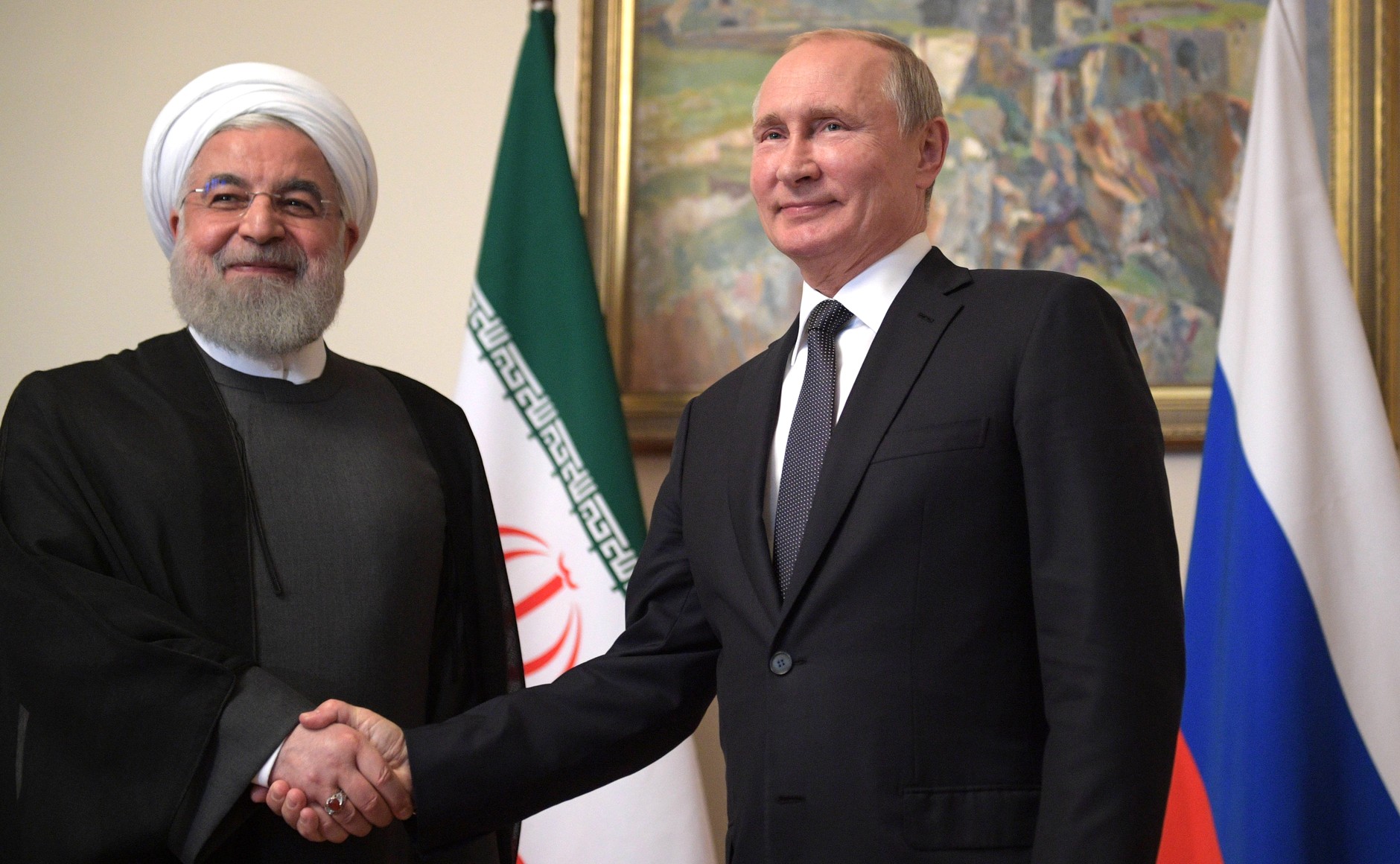 Image source: President of Russia
Image source: President of Russia
Defining The Russia-Iran Relationship
In a recent interview, Secretary of State Mike Pompeo explained the U.S.’ consideration of triggering snapback sanctions on Iran for violating the Joint Comprehensive Plan of Action (JCPOA), commonly referred to as the Iran nuclear deal. A dispute resolution process at the United Nations could reapply sanctions lifted as part of the JCPOA. For snap back sanctions to go into effect, the U.S. could notify the U.N. Security Council that Iran is guilty of “significant non-performance” under the JCPOA. However, the Joint Commission Resolution Process currently specifies that only an active signatory of the JCPOA can use this measure. Once the Security Council is notified, a resolution needs nine votes in favor and no vetoes by the United States, Russia, China, Britain, or France to protect Iran from sanctions. If no resolution is made within 30 days, the sanctions from all previous U.N. resolutions would be re-applied on Iran.
Though Russia and China were originally key participants in the sanctions against Iran that led to Iran agreeing to the JCPOA, their interest in supporting the re-imposition of sanctions is likely low. In particular, Moscow’s closer relationship with Iran has helped cement Russia’s position in the Middle East since the beginning of its involvement in the Syrian Civil War in 2015. U.S. efforts to trigger snapback sanctions presents Russia the opportunity to capitalize on a further deterioration of the United States’ reputation in the Middle East. Do Iran and Russia have an opportunity to strategically leverage their relationship, or will the two countries remain allies of convenience?
Russia-Iran Relationship Background
Economic relations
Russia’s supportive role in passing the JCPOA encouraged closer economic ties between Iran and Russia. Even though Russia has little interest in buying Iran’s main export, oil, Russian companies including Lukoil and Rosatom have explored opportunities in Iran’s oil and energy sector. In July 2016, Russia doubled down on an agreement to build nuclear power capabilities in Iran. Russia will provide a loan to fund a gas thermal power plant in Sirik, Iran. Further, Iran and Russia are strengthening economic ties through multilateral agreements. In October 2019, Iran joined a free trade agreement with the Eurasian Economic Union, of which Russia is a member. This deal gives Iran three years to become a permanent member and trading partner with Russia and four other member states.
Washington’s withdrawal from the JCPOA, reapplied sanctions, and U.S. business hesitation to invest in Iran encourages greater partnership between Iran and Russia. With few options for European investment, Iran seems eager to deepen economic connections with Russia in an effort to overcome the sanctions imposed on both countries by the United States.
Military Coordination
The war in Syria creates further potential for a long-lasting Russian-Iranian partnership. Military cooperation between the two countries is at an unprecedented level, considering the tense history between them. Russia and Iran are the top military supporters of Syrian President Bashar Al-Assad’s efforts to win the country’s nine-year conflict.
Russia-Iran relations in the post-JCPOA era is characterized by increased frequency of negotiations between political and military leaders of the two countries. For example, in July 2019, Russia and Iran signed a memorandum of understanding that formalizes military cooperation between the two countries in Syria. The renewal of the S-300 missile defense system contract following approval of the JCPOA signals strengthening of Russia-Iran relations. Russia and Iran may potentially cooperate further due to mutual opposition to NATO expansion into the Caucuses and the US-led regime change strategy in Syria, despite differences in their Middle East strategies.
Common Threat Perceptions
Abdolrasool Divsallar, senior fellow at the Institute for Middle East Strategic Studies in Tehran, identifies common threat perception as a pillar of Iranian-Russian security convergence. He argues that “both countries see their identity and stability as focal points threatened by the international order.” A deeper Iran-Russia relationship can be expected to develop over common threats to stability such as:
Sanctions
The United States has imposed sanctions on Iran in various forms since 1979. On August 6, 2018, the U.S. re-imposed sanctions to target Iran’s nuclear program. Russia, too, is a target of U.S. and Western sanctions. In reaction to the annexation of Crimea, the U.S. and other Western countries imposed sanctions on Russia. The common threat of sanctions added a “justified reason” for Moscow to deepen economic ties to Tehran, according to Alireza Samoudi, Assistant Professor from Mofid University of Qom. Samoudi also argues that “the Ukraine crisis convinced Moscow to improve its relations with the Middle Eastern states to prevent its international isolation.” Circumstances continue to encourage a strong Russia-Iran relationship, such as the unresolved Ukraine conflict and the escalation of US-Iran tensions.
Terrorism
Vladimir Putin said that “relations between Russia and Iran are multifaceted, multilateral” and that “this concerns the issues of stability in the region, our joint efforts to combat terrorism, including in Syria.” Radical jihadi groups like ISIS, radical Sunni insurgents, and Wahhabi extremists pose a threat to internal stability in Syria, Iran, and Russia, respectively. In January 2015, Iran and Russia signed a military agreement to combat terrorism together. This agreement stipulates that the two countries will exchange military personnel for training purposes and the reciprocal use of port facilities for their naval forces.
Key Take Away
The U.S.’ exit from the JCPOA and the recent killing of Qasem Soleimani suggests that tensions with Iran will not subside in the short term. Applying pressure on Iran is exacting a geostrategic price of encouraging Moscow and Tehran to form a strategic partnership to oppose U.S. interests in the Middle East.





